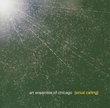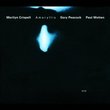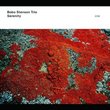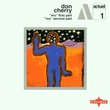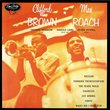| All Artists: Art Ensemble of Chicago Title: Tribute to Lester Members Wishing: 1 Total Copies: 0 Label: Ecm Import Release Date: 11/18/2008 Album Type: Import Genres: Jazz, Pop Styles: Avant Garde & Free Jazz, Tributes Number of Discs: 1 SwapaCD Credits: 1 UPC: 044017066222 |
Search - Art Ensemble of Chicago :: Tribute to Lester
 | Art Ensemble of Chicago Tribute to Lester Genres: Jazz, Pop
It's hard not to think of how much more enjoyable this tribute to the late, great Lester Bowie would be if he were still around to play trumpet on it. Reduced to a trio by the passing of Bowie in 1999 and the resignation o... more » |
CD DetailsSynopsis
Amazon.com It's hard not to think of how much more enjoyable this tribute to the late, great Lester Bowie would be if he were still around to play trumpet on it. Reduced to a trio by the passing of Bowie in 1999 and the resignation of reed player Joseph Jarman, who left to devote himself to his duties as a Shinsu Buddhist priest and to indulge in other musical pursuits, the Art Ensemble of Chicago lacks the exuberance it once did. That's partly because there's not enough to offset the basic dryness of reedman Roscoe Mitchell's personality, as reflected in the deliberate "Suite for Lester," which takes an all-too-tasteful classical turn. Still, the band's return to ECM, for which it made some excellent albums at the turn of the '80s, occasions some winning sonic excursions by Mitchell, bassist Malachi Favors Moghostut, and drummer Famoudou Don Moye. And give credit to the Art Ensemble for refusing to do what other bands have after a legend departs, which is to try and replace someone who is irreplaceable. --Lloyd Sachs Similar CDs
|
CD ReviewsThe AEC vision re-focused R. Hutchinson | a world ruled by fossil fuels and fossil minds | 12/07/2003 (5 out of 5 stars) "My first reaction to the idea of the AEC as a trio was that it was a bad idea -- going on without Joseph Jarman was one thing, but without Lester Bowie as well? But I was mistaken -- this is an excellent album, and indeed, a fine tribute to Lester. If you've heard any of Roscoe Mitchell's recent solo recordings, you will immediately detect that this is different, that it is indeed the AEC, when you hear the ritualistic, Pan-African percussion opening number composed by Famoudou Don Moye, "Sangaredi." If you've ever seen them live, you can just picture Moye and Favors in full African regalia... Roscoe eventually moves from percussion to sax, with some blasts on a bass saxophone, and a two-note figure that somehow conveys all the feeling of a more developed melody. Mitchell's "Suite for Lester" begins with an elegy on alto, followed by a Bach-like piece for flute, and an up-tempo R&B sketch on the bass sax -- three stages in the grieving process. Roscoe reworks the Bowie number "Zero" next, with its memorable melodic line, and then comes a powerful version of "Tutankhamun," an old composition by the bassist, Malachi Favors Moghostut. Compared to a 1969 Paris recording of the piece (with Favors, Mitchell, Jarman & Bowie -- no percussion), this new version is tighter, clearer and stronger. The collective improvisation "As Clear as the Sun" features Roscoe utilizing circular breathing to produce a continuous solo of over ten minutes on soprano sax. Depending on your mood this can be exhausting, but if you bring some energy to it, it is exhilarating -- the invention and variation does not flag over the soaring flight. Finally, "He Speaks to Me Often in Dreams," a percussion improvisation, returns to the mystery of sound and space where the ritual began. In retrospect, perhaps it's not so surprising that this is a strong record. The late 1980s and early 1990s were not a good time for the AEC -- their energy and vision faltered, and the members' various side projects did not seem inspired either. Jarman left the group to build a Buddhist center in Brooklyn. The last strong AEC album was "The Alternative Express," released on DIW in 1989. ("Coming Home Jamaica" from 1998 was particularly disappointing, as they had not recorded for several years.) But then Roscoe Mitchell got a fresh wind, and began to release a series of superb records -- the 2-disc solo "Sound Songs" on Delmark in 1997, "The Day and the Night" on Dizim in 1998 with a trio, and the "Nine to Get Ready" nonet on ECM in 1999. Roscoe was the original leader of the group, and so it seems that his revitalization and the renewed connection with the ECM label, along with the sad death of Lester Bowie, paved the way for this outstanding recording. Lester would be happy to know that the Spirit lives on!" Lester's Absence, In Spirit and Sound Jason Gubbels | San Diego, CA | 10/31/2004 (5 out of 5 stars) "Lester Bowie was, in many ways, the heart and soul of the AEoC. His technique may not have ranked among the greats, but his sly sense of humor and expressive slurs helped define the group as much as their colorful costumes and "little instruments." When he died, the Art Ensemble died with him, so one would think. Yet the group rallied to produce a wonderful tribute to him that succeeds not only as a tribute, but as a cohesive piece of work. Blessed with the wonderful production values of ECM, you can finally hear with perfect clarity every rattle and shake. It gets frenzied during the soprano sax workouts, it bobs and sways during the rhythm-based opener, and fades to a gorgeous finish of found sounds and beats. This is an album that will obviously appeal to AEoC fans, but also to the uninitiated. How sad that Malachi Favors, the bass player on this cd, died shortly thereafter. Yet if any group can rally, can produce another album that pays fitting tribute to a legendary figure and yet also stand on its own as solid jazz, it is this group." Boodbye Lester Corrado Beldi | Jazz Critic, Milano, Italy | 01/09/2004 (4 out of 5 stars) "Gli amanti dell'Art Ensemble of Chicago non potranno che commuoversi ascoltando il tributo al compianto Lester Bowie, scomparso improvvisamente nel 1999. I tre reduci del glorioso quintetto (Joseph Jarman si dedica ormai esclusivamente alla meditazione ed all'Aikido), hanno inciso un album in cui l'assenza degli assoli da Brass Band di Lester Bowie (supremo erede di Louis Armstrong), non è certo nascosta, anzi diventa il punto di partenza per una costante evocazione del vecchio compagno di viaggio, attraverso un distillato di suoni sommessamente meravigliosi.
Arthur Cravan" |

 Track Listings (6) - Disc #1
Track Listings (6) - Disc #1